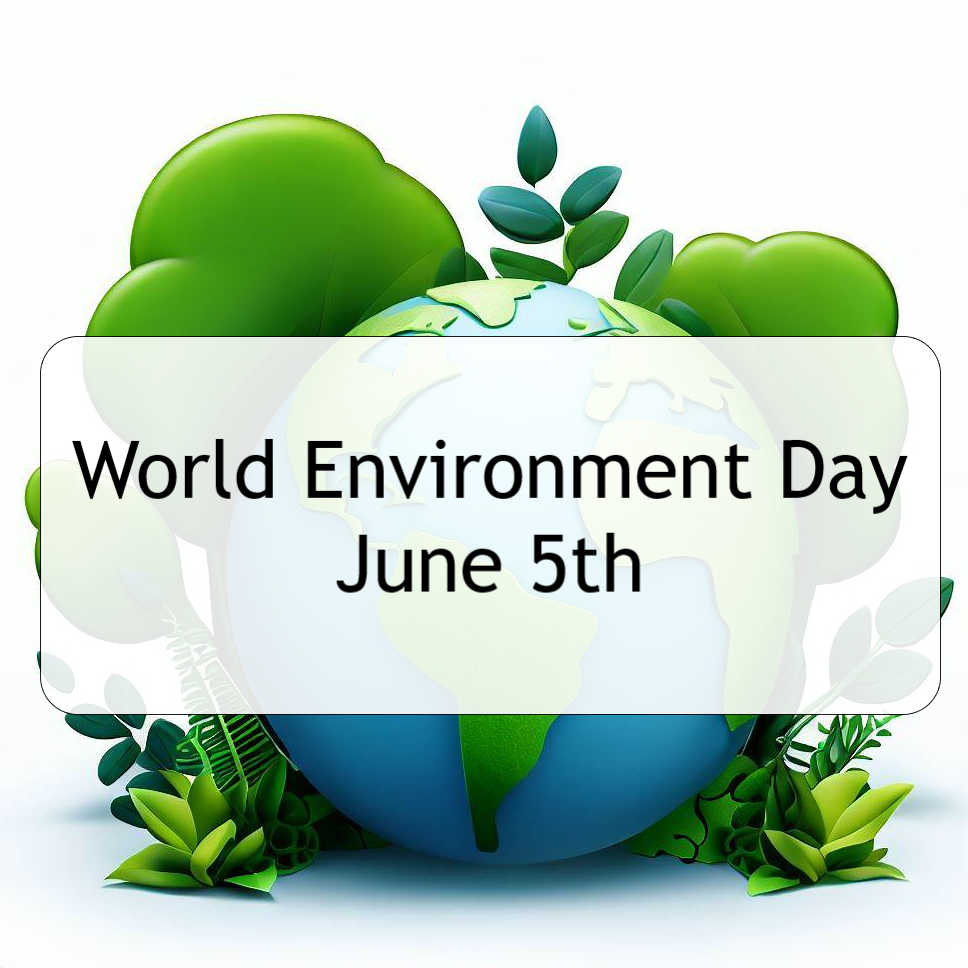World Environment Day, observed on June 5th each year, is a global platform that encourages people to take positive action to protect our planet. It serves as a reminder of the importance of environmental conservation and sustainability. This day provides an opportunity for individuals, communities, organizations, and governments worldwide to come together and raise awareness about pressing environmental issues and initiate meaningful changes.
History of World Environment Day:
The United Nations General Assembly established World Environment Day in 1972 during the Stockholm Conference on the Human Environment. The purpose was to stimulate global awareness and encourage positive action to protect the environment. Since then, this annual event has grown into a significant platform for environmental advocacy and participation.
Theme for World Environment Day 2023:
"Restore Our Earth": Each year, World Environment Day focuses on a specific theme to highlight an environmental challenge and prompt action. The theme for 2023, "Restore Our Earth," emphasizes the urgency of conservation, restoration, and sustainable development to address the global environmental crisis. It calls for collective efforts to repair the damage already done to the planet and promote sustainable practices for a greener future.
Importance of World Environment Day:
World Environment Day plays a vital role in raising awareness about environmental issues, encouraging policy changes, and promoting sustainable practices. It serves as a reminder that we all have a responsibility to protect and preserve our natural resources. By celebrating this day, we can inspire individuals, communities, and governments to take action and make a positive impact on the environment.
Activities and Initiatives:
World Environment Day brings together people from all walks of life to participate in various activities and initiatives. These include:
-
Tree Plantation Drives:
Organizing tree planting events to increase green cover and combat deforestation. -
Clean-up Campaigns:
Conducting clean-up drives in parks, beaches, and other public spaces to reduce litter and promote cleanliness. -
Environmental Workshops and Seminars:
Hosting educational events to raise awareness about environmental issues, climate change, and sustainable practices. -
Awareness Campaigns:
Engaging in social media campaigns, art exhibitions, and public events to educate the public about pressing environmental challenges and ways to address them. -
Sustainable Lifestyle Challenges:
Encouraging individuals to adopt sustainable habits such as reducing waste, conserving water and energy, and embracing eco-friendly alternatives. -
Policy Advocacy:
Influencing policymakers to prioritize environmental protection, support renewable energy, and implement sustainable development practices. -
Collaboration and Partnerships:
Promoting partnerships between governments, organizations, and communities to address environmental challenges collectively.
Important timeline events related to World Environment Day:
1972: The United Nations General Assembly establishes World Environment Day during the Stockholm Conference on the Human Environment.
1974: The first World Environment Day is celebrated on June 5th with the theme "Only One Earth."
1987: The Montreal Protocol, an international environmental agreement to protect the ozone layer, is adopted on World Environment Day.
1992: The United Nations Conference on Environment and Development, also known as the Earth Summit, takes place in Rio de Janeiro, Brazil. The summit leads to the adoption of important agreements such as the Rio Declaration and the Agenda 21.
2001: The United Nations launches the "Decade on Education for Sustainable Development," aiming to integrate sustainable development principles into educational systems worldwide.
2008: The International Year of the Reef is observed to raise awareness about the importance of coral reefs and the threats they face.
2010: The theme for World Environment Day is "Many Species. One Planet. One Future." It highlights the importance of biodiversity conservation.
2012: The United Nations Conference on Sustainable Development, known as Rio+20, takes place in Rio de Janeiro, Brazil. The conference focuses on sustainable development goals and green economy.
2015: The Sustainable Development Goals (SDGs) are adopted by the United Nations General Assembly. They provide a framework for global action on poverty eradication, social inclusion, and environmental sustainability.
2016: The theme for World Environment Day is "Go Wild for Life," aiming to combat the illegal trade in wildlife and promote the conservation of endangered species.
2020: The theme for World Environment Day is "Time for Nature," emphasizing the importance of biodiversity and its role in providing essential ecosystem services.
2023: The theme for World Environment Day is "Restore Our Earth," focusing on the need for conservation, restoration, and sustainable development to address the global environmental crisis.
Throughout the years, World Environment Day has been a catalyst for raising awareness, promoting sustainable practices, and encouraging action to protect the environment. It continues to be an important platform for addressing environmental challenges and working towards a more sustainable future.
Important statistics:
| Statistic | Description |
|---|---|
| 1. 9 million | The estimated number of species on Earth, many of which are currently threatened or endangered. |
| 2. 1 million | The number of species at risk of extinction in the coming decades, according to scientists. |
| 3. 8 million tons | The amount of plastic waste that ends up in the oceans each year, causing severe pollution. |
| 4. 80% | The percentage of global wastewater that is discharged into water bodies without treatment. |
| 5. 2.4 billion | The number of people worldwide without access to basic sanitation facilities. |
| 6. 17% | The decline in global forest cover since pre-industrial times, leading to biodiversity loss. |
| 7. 1/3 | The proportion of global food production that is lost or wasted each year. |
| 8. 2°C | The maximum recommended global temperature increase to avoid catastrophic climate change. |
| 9. $26 trillion | The estimated economic cost of ecosystem degradation and biodiversity loss by 2050. |
| 10. 2030 | The target year for achieving the Sustainable Development Goals (SDGs) set by the United Nations. |
These statistics highlight the urgent need for environmental conservation, sustainable practices, and collective action to address the global environmental challenges we face.
Conclusion: World Environment Day is a powerful global platform that brings people together to celebrate the beauty of our planet and take action to protect it. By actively participating in this day, we contribute to a sustainable future, ensuring that future generations can enjoy the beauty and resources our planet offers. Let us embrace the theme of "Restore Our Earth" and work together to create a greener, cleaner, and more sustainable world. Remember, every small action counts and can make a significant difference in preserving our environment for the years to come.
Discover More
Most Viewed
Christmas is a season of joy, love, and traditions. And what better way to get into the holiday spirit than through timeless carols? These musical gems have been bringing people together for generations. Here’s our ranked list of the Top 10 Christmas Caro…
Read More
















